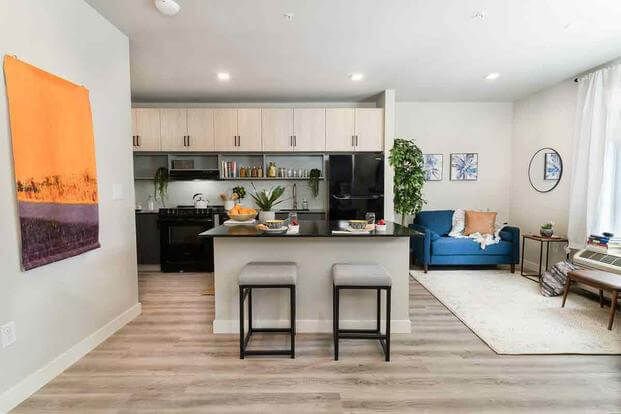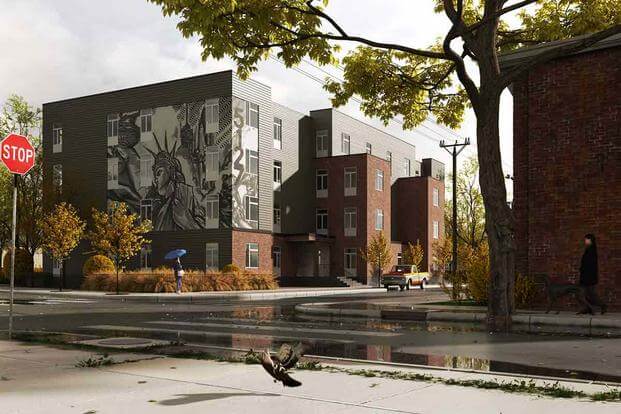As the Department of Veterans Affairs continues a push toward eliminating homelessness among the nation's veterans, a Philadelphia-based nonprofit is opening an apartment complex it hopes will serve as a model for sheltering former service members.
A 47-unit garden apartment complex known as Veterans Village is set to open in the coming weeks in the city's Frankford neighborhood, providing affordable housing to veterans who have recently left the service or are in emergency shelters or temporary housing.
As a result of the complex's modular construction, the units were built in just four months at a cost of roughly $6 million, one-third the cost of conventional construction of a low-end apartment complex, despite included touches like stainless steel appliances.
Read Next: Cut Down Defense Spending 'Wish Lists,' Lawmakers Tell Pentagon
The pieces of modular buildings are constructed in Hamlet, North Carolina, and contain all the necessary components for a home, including the electrical and plumbing systems and finished surfaces.
They were transported to Philadelphia and pieced together on site, requiring essentially "seaming work" to connect the pieces and waterproof the building, including installing a roof, according to Dana Spain, a Philadelphia real estate developer and president of the nonprofit that built Veterans Village.

Spain said the speed, low cost and quality of modular construction makes it "more efficient and cost-effective" for building affordable housing.
"It's not traditional affordable housing. It's not micro studios, it's not tiny homes. ... It's being built at market grade with ample-size apartments and finishes that, we believe, present to people ... a respectable place for them to be proud to call home," Spain said during an interview with Military.com.
In 2018, Spain went to work for the construction company that builds the modules, Volumetric Building Companies. Three years later, she convinced the corporation to establish a charity arm, the VBC Giving Foundation, to focus on helping vulnerable populations.
Having been involved in a nonprofit program that supported homeless women veterans, she said she saw the need for high-quality housing for veterans facing transition.
"Veterans make up less than 1% of the population of America, and it's a travesty they are not being served," Spain said. "This is a personal mission to house my brothers and sisters in houses that I would live in, that my family would live in."
The Veterans Village in Philadelphia is the foundation's first foray into providing affordable housing for the disadvantaged. The group's goal is to provide similar housing for abuse survivors, children aging out of foster care, and seniors as well as veterans -- 15 villages across the country and a couple overseas, with a third intended to house veterans.
The idea, Spain said, is for the VBC Giving Foundation to raise funds itself and build additional complexes toward its goal of 15 in three years. But it also is willing to work with local nonprofit organizations and private entities in locations of need to share the architectural plans, engineering and construction capabilities.
The Philadelphia complex was supposed to open late last year, but supply chain issues and the availability of parts caused delays for residents eager to move into their new spaces. It also came in roughly $250,000 over budget but, given the soaring costs of building supplies during a period of high inflation and unanticipated additions to the project, like additional security and a computer lab, Spain said the overage was manageable.
"There were no corners cut, and yet we [brought] it in the door at half, a third, or even a fifth of what people are spending on affordable housing across the country," she said.
On any given night, roughly 1,000 veterans are homeless on the streets of Philadelphia. While veteran homelessness has dropped by 55% since 2010, the Department of Housing and Urban Development estimates that more than 40,000 veterans are homeless nationwide, roughly 10% of whom are women, many with children.
The VA announced last week that it housed 40,401 homeless veterans last year, surpassing its 2022 goal by 2,401.
The department has not set a goal for 2023, but VA Secretary Denis McDonough said it will not rest "until the phrase 'homeless veteran' is a thing of the past."
"There are thousands of formerly homeless veterans who are going to sleep tonight in good, safe, stable homes -- and there's nothing more important than that. This is great progress, but it's just the beginning," McDonough said in a statement accompanying the release of the housing numbers.
Spain, whose father Bernard Spain was an Army veteran and whose foundation donated $1 million to jump-start construction of the Philadelphia Veterans Village, and John Jones, a retired Marine Corps staff sergeant who serves as executive director of the VBC Giving Foundation, agreed, saying communities and nonprofits can do their share to ensure that veterans and their families live in safe, quality homes.
"I look at Veterans Village as a place where every veteran, no matter what branch you're in, you can call it home and have it be affordable," Jones said during an interview. "There might be a [Housing and Urban Development] house or a home in a VA compound, but those aren't long-term sustainable models. This is permanent housing."
Spain said that residents will be vetted and accepted to Veterans Village on a case by case basis and must meet a "baseline set of criteria" to keep the environment "safe and sober."
Applications are available online at the complex's website.
"We really have to take care of our most vulnerable populations," Spain said.
-- Rebecca Kheel contributed to this report. She can be reached at rebecca.kheel@military.com.
-- Patricia Kime can be reached at Patricia.Kime@Military.com. Follow her on Twitter @patriciakime.
Related: Homelessness Among Veterans Down 11% Since Start of Pandemic












